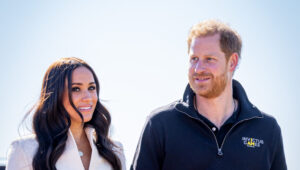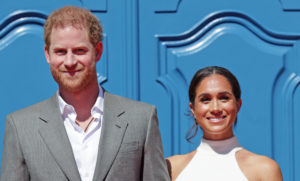Somewhere in Montecito on Sunday, a balding Englishman will celebrate his birthday over a bold Tignanello, clinking glasses with his glamorous Californian wife. Like Footloose, Agadoo and the original Apple Mac, Prince Harry is turning 40 — leaving behind a torrid decade of public spats, todger confessions and expensive therapists.
Nothing quite boils the blood of middle-aged men more than the departure of the Duke of Sussex for a better life out West, an upside-down Steinbeck protagonist. Most will claim to be enraged by the duke’s abandonment of duty or some such sniffy notion, but we all know that his great crime — greater even than that suggestion that his wife once made the sainted Princess of Wales cry over bridesmaid dresses — is self-involvement. His 2021 interview with Oprah alongside his wife Meghan confirmed our most sickening fears: that the toxic creed of “speaking your truth” had become irreversibly lodged in good old Harry Windsor’s brain.
Despite having two of the most unpopular qualities in British culture — he is, after all, a ginger posho — Harry was always respected among the bulk of the public (who, we must remember, regard the royal family with nothing more and nothing less than detached, bemused affection). He was the light relief to William’s sombre nobility, the cheeky spare who winked at Noughties lad culture and seemed to enjoy his privilege rather than wince at it, frolicking around in states of controversial dress (or undress) and injecting a sense of normality — fun, even — into a unit which had been so wracked by tragedy and, worse, off-putting stuffiness.
But his capture by millennial therapy culture signalled the death of this happy-go-lucky persona. For those who once grinned that Harry was a “rum lad”, this was a personal affront precisely because of the loss of that pleasing irony, the sauciness and levity which turns even bluebloods into good drinking partners. When the winks stopped, we sobered up and realised we had been sat opposite a quiffed clown, made up to look like a cheeky friend. The slipping of that mask must have hurt — particularly among those middle-aged men, for whom any association with the touchy-feely bollocks of California is not just embarrassing, but offensive.
Prince Harry is, without a doubt, the most millennial millennial to ever have breathed. In his trajectory from cheeky chappy to earnest, self-regarding counselling patient lies the story of his generation’s downfall into cringe. Though he sees his transformation as a journey to his authentic self, it is crystal clear to everyone not living under the glass dome of American therapy-speak that he has simply journeyed from one posture to another, each freighted with unbearable artifice. For the first, 1,000 years of monarchy and the straitjacket of the British class system determined his route from genteel thicko (he left Eton with a B in art, a D in geography and a dash of notoriety for smoking weed) to Army to nice girlfriend called Cressida. Had he been a commoner, he would have ended up as a mid-level consultant in Putney, probably in the shadow of his barrister brother William. Raffles has lost a lot of custom since his enlightenment.
But this second, new persona — one which he hard-launched with the Oprah interview — is no less fated. With the awakening of West Coast elites comes a compulsory set of fixations, which I like to imagine their shrinks laugh about together at dinner parties. First and foremost, the wrongs of your parents, childhood trauma. Of course, Harry has more of this than most, and that is fair enough. But the endless remonstrations with your family, friends and “support network” — and a compulsion to cut them out for historical wrongs — is so distinctively millennial, and something which Abigail Shrier has rightly identified as having engendered complexes and neuroses in people who, for the most part, would have otherwise chugged along without a problem. Harry represents the great millennial task of seeing yourself as a kind of project, and the fallacy that it is not what you do, but how you feel about what you do, which matters.
His description of his teenaged family dynamics in Spare is so typical of the desire to frame ourselves as victims at the centre of a great conspiracy to hurt us, and to seek to “call out” and shame those responsible for the problems they have landed us with for the rest of our lives. It is a selfish culture of retribution, under the guise of “boundaries” and “transparency”, which has motivated Harry and countless other special children who have grown up to be the insufferable, childlike adults we all know. Harry has traded quiet, fair reconciliation for what amounts to a protracted family shouting match at a restaurant, the sulky teenager coming home from university armed with a new vocabulary and a clutch of crimes for which they’ll get justice now. I have been that person — most of us have — but to do so on the cusp of middle age, and via the bookshelves of Waterstones, is quite another matter. And in place of the grown-up realisation that your parents might have had no idea what they were doing either, he has trapped himself in a perpetual fantasy where he is a little Cinderello, describing Camilla as a “wicked stepmother” and his brother as an “arch-nemesis”.
So, childhood trauma? Check. Second millennial mania: a pathological obsession with privilege. If anyone should feel guilty about being a nepo baby, Harry should. But it has consumed his life, so that every sun-soaked, truth-living Californian minute is an act of repentance for chilly privilege in dreary old England. Harry and Meghan’s discussions around race are not the egregious sacrilege some newspapers claim them to be, nor is Meghan unjustified at all in complaining about the hideous, sexist coverage she has had to endure. An old colleague once described her, with great, sickly pride, as the “People’s Prostitute” — and the ire middle-aged men hold for her is definitely about something more than her being annoying. But what really sticks in the craw is not the Sussexes’ progressive values — which I find to be admirable, requiring considerable bravery in today’s media climate — but the damned hypocrisy of it all. It is difficult to be told to “check your privilege” by two Montecitan millionaires, and I fear they represent a very millennial crusade for justice: that is, one which privileges Instagrammable opportunities over substance. Besides, an obsession with one’s own privilege is really another opportunity to practise that terrible habit of the over-therapised — wanging on about ourselves.
Overall, the Sussexes — and Harry, in particular (we cannot fault Meghan for being from wet-blanket Los Angeles) embody the great tragedy of the millennial: the generation which, faced with new, strange waves of social disharmony, decided to do nothing about it and think about themselves instead. Harry is a harbinger of the turning-inwards of youth culture, a preference for introspection over duty, and the self over the whole. He is, too, a model of the irreversible way American obsessions have crossed the Atlantic, and planted themselves in the formerly funny, sardonic and self-knowing English.
Whether social media’s preference for the mooningly internal over the societal persists for other generations is up for debate; my own has seized it for its brand of activism — for instance, on Gaza — which yet may prove as hollow as the Sussexes’ Archewell Foundation Instagramming. Harry’s millennial earnestness has gone down like a cup of warm Sancerre with Gen Z who are, on the whole, much funnier and much less cringe. And right behind us, Gen Alpha is ready to snatch the crown from their parents’ receding hairlines: Prince Louis will no doubt prove that we ain’t seen nothing yet.
One wonders how Harry’s own story will end. Commentators, admittedly licking their lips over any perceived cracks in the ducal union since day one, have speculated that all is not sunshine and reiki for H&M. Harry’s teenagery conduct has left him rather rootless, and if speculation proves correct that Meghan is having a much better time of it than he is, rubbing shoulders with Ellen DeGeneres and launching lifestyle brands, then the “pootling” prince might find himself up the proverbial creek. If an attempt to rejoin the fold is ever on the cards, it would be to reunite with a family who has grown eminently more loved by the public for each year of his absence. It is hard to imagine Harry ever commanding the affection that Kate does, nor the public ever tolerating a sepia-toned Enid Blyton-style video of the Sussex brood like the one released this week upon the princess’s announcement that she was now cancer-free.
At 40, you may not have to give up the lifelong task of exploring your terribly interesting self — but at the very least, you must have grown up. My own birthday being the day before Harry’s, I’ll raise a glass to the ghost of the cheeky duke: and to all the reformed Eton boys who came before him. Sadly, my special day will not involve the automatic inheritance of £8 million — but at least I’ve got all my hair.
Disclaimer
Some of the posts we share are controversial and we do not necessarily agree with them in the whole extend. Sometimes we agree with the content or part of it but we do not agree with the narration or language. Nevertheless we find them somehow interesting, valuable and/or informative or we share them, because we strongly believe in freedom of speech, free press and journalism. We strongly encourage you to have a critical approach to all the content, do your own research and analysis to build your own opinion.
We would be glad to have your feedback.
Source: UnHerd Read the original article here: https://unherd.com/



